Search results
Projects
Being Wiradjuri Together
Co-designing self determination
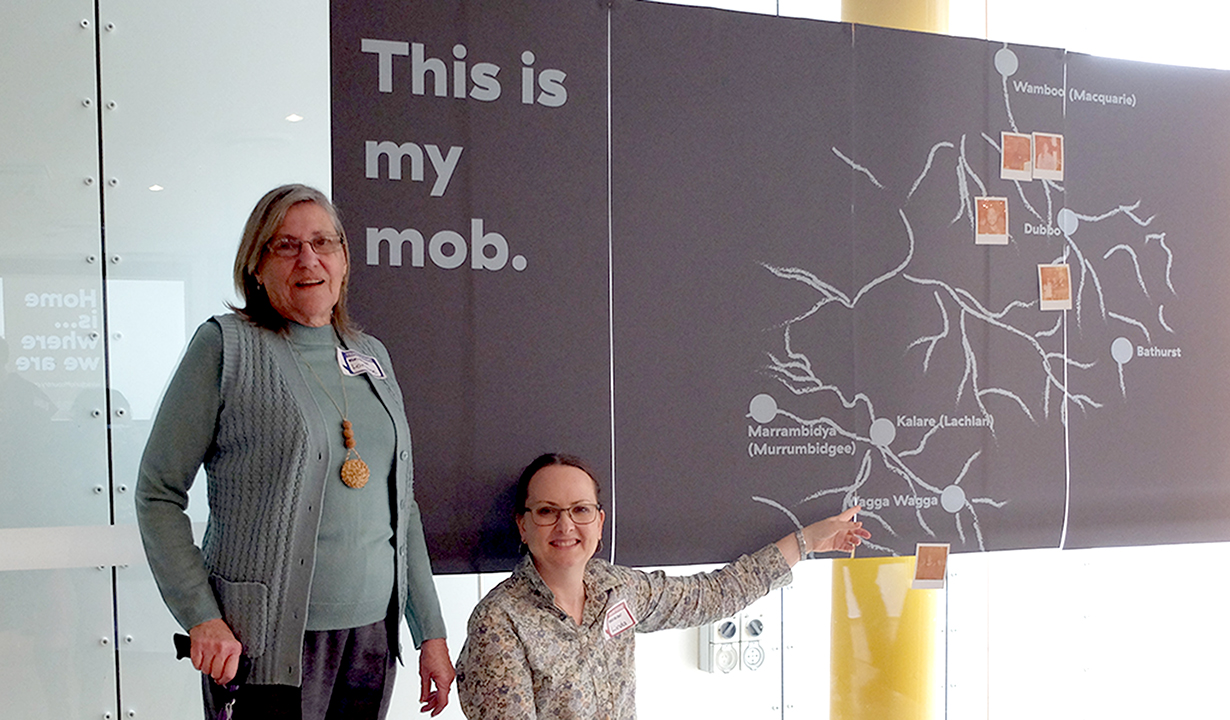
What does it mean to be non-Indigenous and design with, and in response to, Indigenous peoples and knowledge? How can design be of substantial, long-lasting benefit to Indigenous people?
Being Wiradjuri Together is about Wiradjuri people who are self-determining — renewing cultural practices and expressing what it means to be Wiradjuri. This is catalyzed through co-designing with Wiradjuri to create various mechanisms — print, video, social media, digital platform and community events — to connect, share and be Wiradjuri together.
If you would like to get involved with this project, fill out the form below or reach out to project leaders via the contact info provided alongside each bio.
People
Peter West
Lecturer, Communication Design
School: Media and Communication
Peter West is a Communication Design lecturer and PhD candidate. He has a diverse teaching practice which moves across areas such as communications strategy, art direction and design for social change. He draws upon practical industry experience as both a freelance art director and copy writer within both multinational communications agencies and health related communications strategies within the not for profit sector.
His research focuses on ways in which Non-Indigenous creative practitioners can better understand their subject position in relation to Indigenous sovereignty. West is as a chief investigator on Sovereign Weaving Project: ‘Practicing Sovereign Relations through Weaving a Treaty’. The project seeks to support Indigenous Nations to practice their sovereignty, through the realisation of a woven treaty as the conclusion of their diplomatic responsibilities.
Aesthetics, Politics and Histories: The Social Context of Art
AAANZ Conference 2018
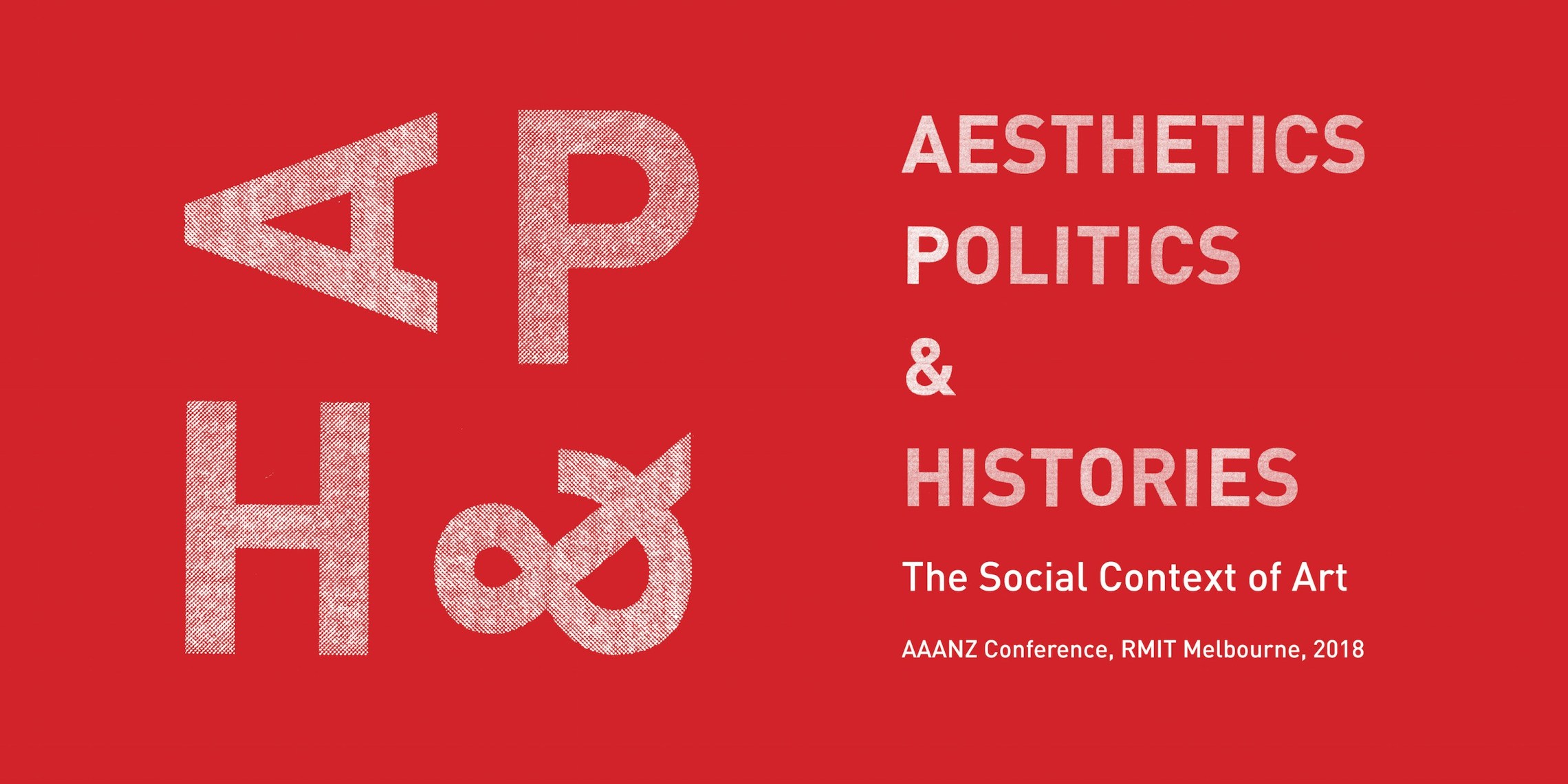
The 2018 AAANZ conference opens critical dialogue on the histories of art by examining the social contexts of aesthetics and politics. Bringing together art historians, theorists, curators, critics, and artists from across the region, the conference offers a stimulating four-day program of panels and papers, publication prizes, masterclasses and encounters with Melbourne’s vibrant arts sector with a parallel artistic program to be announced in coming months.
The conference features distinguished keynote speakers who will present expanded and alternative frameworks for understanding the diverse contexts and histories of art. Gabi Ngcobo (South Africa), curator of the 10th Berlin Biennale; Genevieve Grieves (AUS), Head of the First Peoples Department at Museums Victoria; and Ema Tavola (Fiji), independent curator are each engaged in critical curatorial practices aimed at democratising and decolonising art institutions and opening up art collections to alternative perspectives and narratives traditionally overlooked by museums and galleries. Art historian Professor Griselda Pollock (UK) from Leeds University is renowned for her postcolonial, queer feminist analysis of the visual arts, visual culture and cultural theory and research of trauma and the aesthetic in contemporary art. Curator and Associate Professor David Teh specialises in contemporary art in Southeast Asia.
The intersection of art and society is where differing worldviews and opposing epistemologies can meet and clash. Art offers a site for modelling political alternatives, questioning dominant discourses, and producing new historical narratives. Responding to the political, economic and environmental tensions of the present moment, the conference explores the relationship of the arts to social life throughout history. Located in a region marked by multiple and overlapping colonial and postcolonial histories and contemporary processes of globalisation, the conference aims to initiate critical dialogues that foreground the complex contexts, diverse practices, multiple histories, and contested trajectories of art.
KEYNOTE SPEAKERS
Genevieve Grieves is Worimi – traditionally from mid north coast New South Wales – and has lived on Kulin country in Melbourne for many years. She is an educator, curator, filmmaker, artist and oral historian who has accumulated nearly twenty years’ experience in the arts and culture industries. Some of her projects include the documentary, Lani’s Story; the video installation, Picturing the Old People; and, she was the Lead Curator of the internationally award-winning First Peoples exhibition at the Melbourne Museum. Genevieve has a role as a public intellectual and speaker and is undertaking her PhD in arts, memorialisation and frontier violence. She is Head of the First Peoples Department at Museums Victoria.
Gabi Ngcobo is the curator of the 10th Berlin Biennale. Since the early 2000s Ngcobo has been engaged in collaborative artistic, curatorial, and educational projects in South Africa and on an international scope. She is a founding member of the Johannesburg based collaborative platforms NGO – Nothing Gets Organised and Center for Historical Reenactments (CHR, 2010 – 14). NGO focusses on processes of self-organization that take place outside of predetermined structures, definitions, contexts, or forms. CHR responded to the demands of the moment through an exploration of how historical legacies impact and resonate within contemporary art.
Recently Ngcobo co-curated the 32nd Bienal de São Paulo, which took place in 2016 at the Ciccillo Matarazzo Pavilion in São Paulo, and A Labour of Love at Weltkulturen Museum, Frankfurt am Main in 2015⁄16) and travelled to the Johannesburg Art Gallery in 2017. She has been teaching at the Wits School of Arts, University of Witswatersrand, ZA, since 2011. Her writings have been published in various catalogues, books, and journals. She currently lives and works between Johannesburg and Berlin.
You can find out more about the event here.
If you would like to get involved with this project, fill out the form below or reach out to project leaders via the contact info provided alongside each bio.
People
Marnie Badham
Senior Research Fellow/ Senior Lecturer
School: School of Art
With a twenty-five-year history of art and social justice practice Australia and Canada, Marnie’s research sits at the intersection of socially engaged art, community-based research methodologies and the politics of cultural measurement. Marnie is currently focused on a series of creative cartographies registering emotion in public space; expanded curation projects on the aesthetics and politics of food; and a book project The Social Life of Artist Residencies: connecting with people and place not your own. Marnie is Senior Research Fellow at the School of Art following the prestigious award of Vice Chancellor’s Postdoctoral Research Fellow at RMIT University. Marnie co-leads the Cultural Value Impact Network and is acting Leader for CAST Contemporary Art and Social Transformation research group.
Daniel Palmer
Associate Dean
School: School of Art
Daniel Palmer is Associate Dean of Research and Innovation in the School of Art at RMIT University.
Daniel Palmer’s research and professional practice focuses on contemporary art and cultural theory, with a particular emphasis on photography and digital media. Prior to joining RMIT in 2018, Palmer was Associate Dean of Graduate Research and Associate Professor in the Art History & Theory Program at Monash Art, Design & Architecture. He also has a long association with the Centre for Contemporary Photography in Melbourne, first as a curator and later on the board of management.
Palmer’s book publications include Photography and Collaboration: From Conceptual Art to Crowdsourcing (Bloomsbury 2017); Digital Light (Open Humanities Press, 2015), edited with Sean Cubitt and Nathaniel Tkacz; The Culture of Photography in Public Space (Intellect 2015), edited with Anne Marsh and Melissa Miles; Twelve Australian Photo Artists (Piper Press, 2009), co-authored with Blair French; and Photogenic (Centre for Contemporary Photography, 2005). His scholarly writings on photography and contemporary art have appeared in journals such as Photographies, Philosophy of Photography, Angelaki, Reading Room and the Australian and New Zealand Journal of Art. Palmer has also published over sixty catalogue essays and fifty art reviews since 1997, in art magazines including Art and Australia, Photofile and Frieze.
Palmer has been the recipient of various awards and grants, and has been Chief Investigator on multiple ARC projects, including the ARC Discovery Project ‘Genealogies of Digital Light’ (2008 – 11) with Sean Cubitt and Les Walkling; an ARC Linkage Project ‘Photography as a Crime’ (2009 – 2012) with Anne Marsh, Melissa Miles, Mark Davison and the Centre for Contemporary Photography; and the ARC Discovery Project ‘Curating Photography in the Age of Photosharing’; (2015 – 2017) with Martyn Jolly. Palmer is currently a researcher on the ARC Discovery Project ‘Digital Photography: Mediation, Memory and Visual Communication’ (2020 – 2022) with Scott McQuire, Nikos Papastergiadis, Sean Cubitt and Celia Lury.
COVID frontlines in Australia and New Zealand
Processes, Practices and Perceptions

Australia and New Zealand have each enjoyed a high degree of success in managing outbreaks of COVID 19. Both countries have been early adopters of mask use and contact tracing. The COVID travel bubble organised between Australia and New Zealand speaks to the cultural proximity of the two countries and the shared approaches in tackling the pandemic.
This study seeks to interview participants from across Australia and New Zealand to record their shifting perceptions towards the infrastructural changes and biometrics brought by COVID-19. Specifically, we want to enquire about people’s perceptions and practices of:
• Masks and other PPE use
• Contact tracing via apps, QR codes, pen and paper
• COVID testing and temperature monitoring
• Vaccinations
Our aim is to record the experiences and conditions of participants in New Zealand and Australia to discover how new technologies and practices add new layers of both work and technological awareness to daily routines. We seek to reveal ways of improving techniques of technological delivery and the lives of people that these processes affect.
We welcome all participants and are very keen to hear from a diverse representation of people. We especially welcome older people as well as frontline and essential workers; individuals who, to perform their roles, come into direct contact with the public.
To participate just let us know at the GET INVOLVED link at the bottom of this page.
You can find support with issues related to COVID here if you are in New Zealand, and here if you are in Australia.
PARTICIPANT INFORMATION AND CONSENT FORM
If you would like to get involved with this project, fill out the form below or reach out to project leaders via the contact info provided alongside each bio.
People
Larissa Hjorth
Distinguished Professor and Director, Design and Creative Practice
School: Enabling Capability Platforms
Larissa Hjorth is a digital ethnographer, artist, Distinguished Professor and director of the Design & Creative Practice ECP platform at RMIT University. With Professor Heather Horst, she co-founded the Digital Ethnography Research Centre (DERC). Previously, Hjorth was Deputy Dean, Research & Innovation, in the School of Media & Communication (2013−2016). Hjorth served on the inaugural Australian Research Council (ARC) Engagement & Impact Pilot study assessment panel for humanities and creative practice.
Hjorth studies the socio-cultural dimensions of mobile media and play practices in the Asia-Pacific region with an emphasis on interdisciplinary, collaborative and cross-cultural approaches. She has published a dozen co-authored books, edited over a dozen Handbooks/Companions and has over 40 journal articles.
More recently, Hjorth’s work has become concerned with how we can bring creative, social and design solutions to the growing ageing populations and, in turn, how we might consider scenarios of what it means to die well. She is also studying how our “more-than-human” companions can teach us about new media in everyday life. Hjorth’s last book, Haunting Hands (Oxford Uni Press) looked at how mobile media is being deployed in situations of grief and trauma, her previous book explored how art practice can teach us new acumen into the climate change debate.
Hjorth’s books include Haunting Hands (with Cumiskey 2017), Screen Ecologies (with Pink, Sharp & Williams 2016), Digital Ethnography (Pink et al. 2016) Mobile Media in the Asia-Pacific (2009), Games & Gaming (2010), Online@AsiaPacific (with Arnold 2013), Understanding Social Media (with Hinton 2013), and Gaming in Locative, Social and Mobile Media (with Richardson 2014).
Hugh Davies
Postdoctoral Research Fellow
School: Games
Hugh Davies is an artist, curator and researcher of games and play. His practice explores histories of media devices and cultures of games in the Asia Pacific Region. Awarded a PhD in Art, Design and Architecture from Monash University in 2014, Hugh’s studies in game cultures have been supported with fellowships from Tokyo Art and Space, M+ Museum of Visual Culture and the Hong Kong Design Trust. Hugh is currently a postdoctoral research fellow at RMIT in Melbourne, Australia.
Ingrid Richardson
Professor
School: Media and Communication
Professor Ingrid Richardson has been teaching, supervising and researching in the fields of digital media, mobile media and games for over twenty years. She has a broad interest in the human-technology relation and has published widely on the phenomenology of games and mobile media, digital ethnography and innovative research methods, the relation between technology use and wellbeing, and the cultural effects of urban screens, wearable technologies, virtual and augmented reality, remix culture and web-based content creation and distribution. Ingrid has led or co-led 14 funded research projects, the most recent being an ARC DP [Games of Being Mobile] with Larissa Hjorth. She is contributing co-editor of Studying Mobile Media (Routledge, 2011) and co-author of Gaming in Social, Locative and Mobile Media (Palgrave, 2014), Ambient Play (MIT, 2020), Understanding Games and Game Cultures (Sage, 2020), Exploring Minecraft: Ethnographies of Play and Creativity (Palgrave, forthcoming), and Mobile Media and the Urban Night (Palgrave, forthcoming). Ingrid brings ten years’ experience in university-level HDR management and during this time has actively championed and supported creative methods and practice-led postgraduate research. Over the past five years she has also developed a passion for teaching critical web literacy skills to undergraduate students across all disciplines.
Mark Andrejevic
Professor
School: Media, Film, and Journalism
Mark Andrejevic (Professor, School of Media, Film, and Journalism, Monash University) contributes expertise in the social and cultural implications of data mining, and online monitoring. He writes about monitoring and data mining from a socio-cultural perspective, and is the author of three monographs and more than 60 academic articles and book chapters. He was the Chief Investigator for an ARC QEII Fellowship investigating public attitudes toward the collection of personal information online ($390,000; 2010 – 2014).
Andrejevic has experience conducting both quantitative and qualitative research and is experienced in the focus group and interview methodologies. His work on the personal information project, for example, generated a book, 11 articles and book chapters, and a report on Australian attitudes toward online privacy that was launched by the Federal Privacy Commissioner.
Ruth De Souza
VC Research Fellow
School: School of Art
Dr Ruth De Souza (FACN) is a Vice-Chancellor’s Fellow at RMIT, based in the School of Art and DCP Research Platform. She is a nurse, academic and a community-engaged researcher in gender, race, health and digital technologies. Ruth’s Fellowship will engage health professionals in finding new ways to understand, co-design and implement sustainable cultural safety initiatives in a range of health contexts in response to health inequities.
Prior to moving to Australia in 2013, Ruth worked at AUT University where she taught in the School of Nursing, led the Bachelor of Health Promotion, and was a Senior Research Fellow at the Centre for Asian and Migrant Health Research. Since her arrival in Australia, Ruth has undertaken a wide range of roles, including leading an undergraduate nursing program at Monash University’s Berwick campus; spearheading a unique community-engaged joint research appointment with North Richmond Community Health exploring how wearables and other digital technologies are perceived by people from culturally and linguistically different backgrounds and co-ordinating an interdisciplinary Data Systems and Society Research Network across the University of Melbourne. Ruth has also investigated the applicability of cultural safety in Australia, working closely with The Congress of Aboriginal and Torres Strait Islander Nurses and Midwives (CATSINaM), presenting at their National Professional Development Conferences and delivering training on cultural safety. She has also undertaken a two-year cultural safety project with cohealth (a not-for-profit community health organisation) and Our Watch who work for the primary prevention of violence against women and their children.
News and updates
Being Wiradjuri Together – Winner 2018 Good Design Award, Social Impact

An interactive Wiradjuri-RMIT project is among the winners in the social impact category at the 2018 Good Design Awards. Read more
WrICE Program Partners with Leading Asian Literary Centre
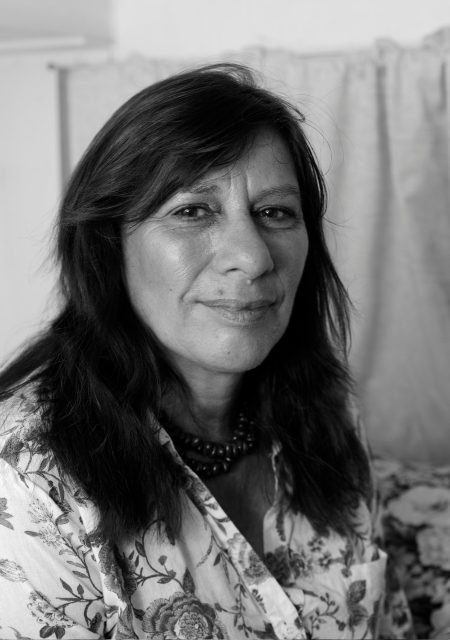
RMIT’s Writers Immersion and Cultural Exchange Program (WrICE), now in its fifth year, will partner with the Jakarta Post Writing Center in 2018. Read more
People
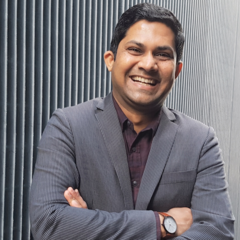
Dr Rohit Ashok Khot is the Deputy Director of the Exertion Games Lab; and Vice-Chancellor’s Postdoctoral Fellow at RMIT University, Australia. Rohit’s research embodies interdisciplinary strength and explores the amalgamation of design and technology in a creative way.
Dr Khot’s track record includes 39 scholarly publications in last 7 years, the majority of which appear in highly competitive HCI conferences and journals and include one best paper and one honorable mention (top 5%) award. Dr Khot’s research also appeared on 30+ press articles including a cover story on Mashable Australia, IEEE Spectrum and TV coverage on Channel 9 News and ABC News 24. He has won prestigious awards including IBM PhD fellowship (2014−2015), 2017 RMIT HDR Prize for Research Excellence (2017), RMIT Vice-chancellor’s Postdoctoral Research Fellowship (2017−2019) and SIGCHI Development Fund Grant (2017,2018). Dr Khot is also involved in organization and management of the Special Interest Group meetings, workshops and symposiums at leading international conferences specifically around food and play, besides serving on program committees for leading international HCI conferences, including DIS and TEI.
Rohit is passionate about playful Human-Food Interaction (HFI) and has an ambitious goal to alter the common perception that food cannot be healthy and pleasurable at the same time.
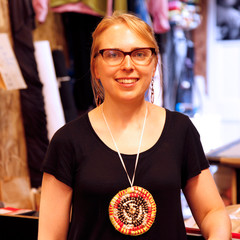
Grace is a published art historian, curator and artist with expertise in contemporary art and design, public art, social practice, social enterprise and community development.
Grace’s research challenges and transforms conventional understandings of the relationship between margin and centre in relation to the cultural economy, contemporary art practice and art history. She has pioneered work on the field of art-based social enterprise in Australia, and has worked extensively in migrant and refugee settlement. She has a multidisciplinary approach that engages with a range of fields including art, design, architecture, sustainability, sociology, business and international development. In addition, through her leadership of the CAST research group, she collaborates with industry and across disciplines to develop research projects that address issues of access, equity and justice.
Grace is a Chief Investigator on the ARC Discovery Project ‘The underworld: outsider artists and the reformulation of Australian art,’ (2018−2020) and the ARC Discovery Project ‘Art-based Social Enterprises and Marginalised Young Peoples Transitions,’ (2017−2019). She has published numerous articles in refereed and unrefereed publications, published creative works in literary journals, authored exhibition catalogues and worked as an editor on local newspapers and engaged widely with local and national media. Grace is the founding CEO & a current Board Director of The Social Studio, a fashion and art based social enterprise working with young people from humanitarian migrant backgrounds in Melbourne.
